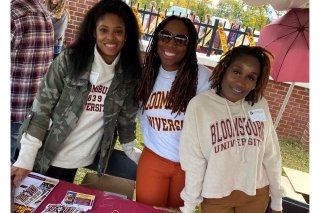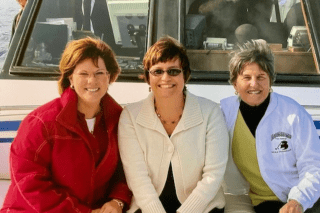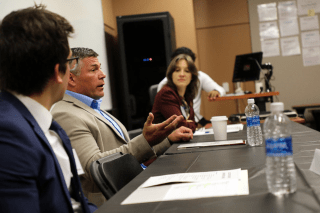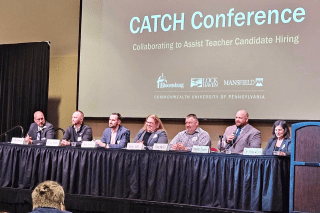Climbing toward inclusion
Posted:
Kimberly Abney ’09 described herself as a “reluctant student” when she came to BU. Today, she serves as an example and support for both students and fellow alumni.

Discovering a sense of belonging at BU became a cornerstone of Abney’s personal and professional growth. She has made it her mission to foster that growth in others through her career as a certified school counselor for the School District of Philadelphia and director of the Right Balance Counseling Center, and as the founder of We DREAM.
“My purpose in life is to help the next person recognize their opportunities and create opportunities for others. I feel like I made it, and it’s only right that I help other people.”
Volunteerism is a large part of Abney’s mission. She has volunteered to support students as a career experience host, speaker for Day of Dialogue, Husky Student Leadership Summit, the PASSHE GEAR UP program, and a workshop leader, career coach, and alumni panelist. Her mentorship program, Thank Goodness I’m Female (TGIF), has improved the graduation rates of female students of color who must overcome academic and personal issues while adjusting to college life. She also provides financial support through the Kimberly T. Abney Scholarship Fund. The rewards, she says, far outweigh what she gives.
“To see that vision come to life and my mentees graduate has been so rewarding. We became a family, and they’re like my little sisters. They value my opinion and lean on me for support [There are many ways] to show up and be present for students.”
Throughout her experiences, Abney has been troubled by the fact that current students do not feel the same level of support as she did as a student. So, she joined the BU Alumni Board to help do something about it. She mentors her colleagues on the board to become more inclusive of underrepresented student and alumni groups and spearheads programs that bring people together.
“My mentees tell me that something is missing; a sense of belonging and fit,” said Abney. “Back in the day, it was easier to network and communicate with different people. Today they feel isolated, and I just felt like more could be done to bring people together.”
Abney took over the chair position for Day of Dialogue, an opportunity for underrepresented students to receive advice from alumni of similar backgrounds and provide feedback on improving their experience on campus.
“When students of color first come to campus, they don’t see many people who look like them, and it can make them feel unsupported,” said Abney. “We need to make sure everyone is accounted for. We have to see what the students need, then do the work. There were people all together on one call [for Day of Dialogue], and it was amazing to see the communication and energy.”
Another way Abney is working to change the feelings of isolation is by providing Black alumni a similar voice and representation, so they are more apt to see themselves as potential mentors and volunteers.
“It’s important for people of color not only to see others like them who made it, but who also want to give back as volunteers,” explained Abney. “When you see yourself in a position, there is a higher chance of you coming back to pay it forward.”
She says that there is typically a fundamental lack of understanding when people of different races mix in social and professional settings, which also affects a person’s willingness to be involved. Her work on the board includes working with her white colleagues to increase their ability to support students and alumni of color. She’s pleased with the progress so far and has been leading diversity, equity, and inclusion training for her board colleagues.
“It’s important to know one’s audience and cultural norms and consider those when talking to someone,” said Abney. “The folks on the board do a good job of being open and understanding. And honest. We all take each other’s perspectives and have been having good conversations.”
Abney was named the 2021 recipient of the William T. Derricott ’66 Volunteer of the Year Award but has no plans to scale back her involvement. She continues to hope that more alumni get involved.
“What you do may not seem like much, but it means the world to somebody else, and you’ve shown them there is a way,” explained Abney. “When students have access to alumni, it provides representation and inclusiveness. It’s all about keeping the light shining.”



